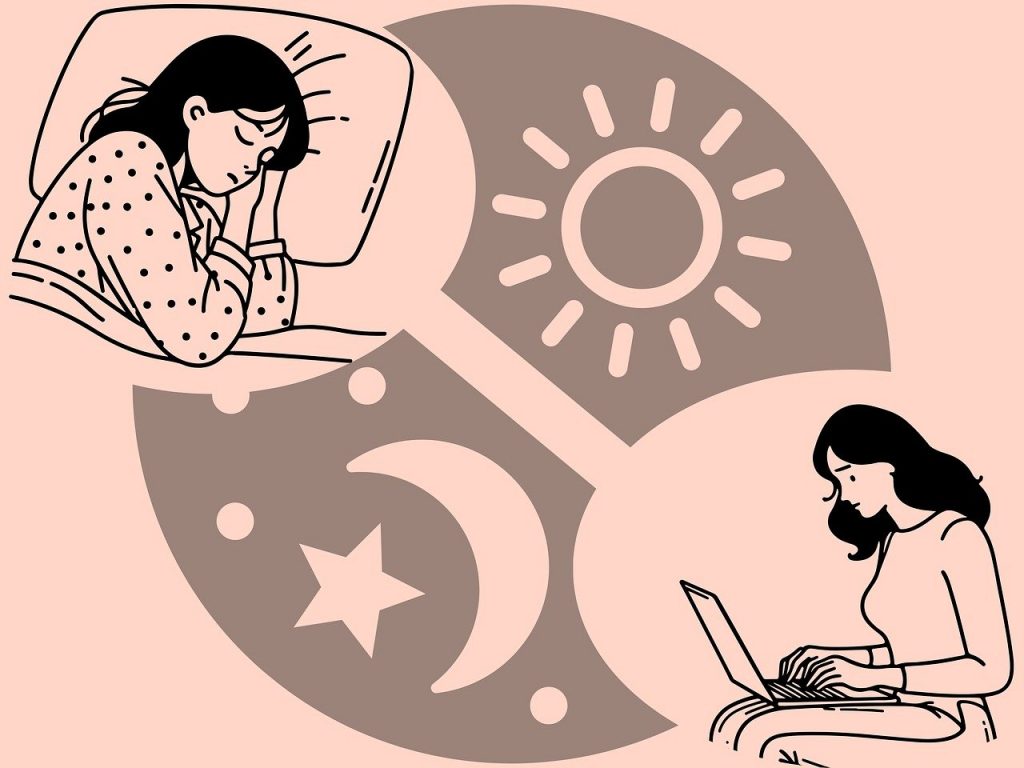
We all have so many external factors that we let run our lives. We have work, family, societal pressure, and so much else. We don’t even sit with ourselves anymore. Everywhere you look, people are trying to escape their lives. People are on their phones; they spend their free time watching movies or watching stupid memes. No one goes outside. No wonder people in our modern world feel so depressed and anxious. We have lost the ability to listen to our bodies when something feels off. No one listens to their intuition; everyone is just looking to other people to teach them how to think. Is this you? If it is, no worries. I was there too. But ask yourself, when was the last time you checked in with your body? Do you know about your circadian rhythm?
In this article I want to help you bring yourself back to your body. One way I plan to do that is by teaching about your circadian rhythm and its importance. I won’t go into much detail here, as you will learn a lot below.
What is circadian rhythm
Circadian rhythm is our internal clock that regulates our sleep cycle and other physiological processes such as body temperature and hormone cycles. The term “circadian” is derived from the Latin “circa diem,” meaning “about a day.” Our circadian rhythms closely mirror the earth’s 24-hour solar cycle. Our circadian rhythms can be adjusted to external feedback such as light. And our circadian rhythms stay the same regardless of temperature fluctuations.
The “master” circadian clock is located in the bilateral suprachiasmatic nucleus (SCN) of the anterior hypothalamus, which regulates most 24-hour behavioral, physiological, and biochemical rhythms. The main “zeitgeber” for circadian rhythm is light, which is also essential for setting our biological clock to the 24-hour light/dark cycle we humans have.
How do our circadian rhythms get messed up and why is it important to fix it?
Our circadian rhythms get disrupted when we get too much artificial light exposure, irregular sleep schedules, bad diets, late screen usage, etc. We also shouldn’t blame ourselves for our circadian rhythms being out of whack; society plays a huge role in circadian rhythm disruption. Some examples of how society impacts our circadian rhythm are shift work, new tech advancements, artificial light, and constant screen time, just to name a few. These societal factors all lead to conflicting environmental exposures, which damage our internal clocks. For example, shift work affects 30% of Canadian workers and many healthcare professionals when it comes to their circadian rhythms.
Desynchronization of circadian rhythm occurs when the peripheral rhythms of wide-ranging tissues and organs are not in alignment with our central, internal clock. The desynchronization and misalignment of our central, internal clock not only interrupts sleep and wake cycles but also other physiological rhythms that affect equilibrium. Circadian rhythm misalignment results in heightened fatigue and a wide range of physical and mental health risks. Research has shown that shift work connected to circadian rhythm disruption has been classified as a carcinogen while also affecting psychological, metabolic, cardiovascular, and sleep diseases.
Another factor in circadian rhythm misalignment is your eating patterns. Food consumption outside normal eating patterns may cause circadian rhythm misalignment. A lab study done on mice and hamsters showed that predictable eating patterns prevent obesity, hyperinsulinemia, and hepatic steatosis. So you can conclude that having a predictable eating pattern is pretty beneficial for us humans.
Misaligned circadian rhythms may lead to
- Increased risks of physiological, metabolic, and cardiovascular diseases.
- High fatigue
- Obesity
- High blood pressure
- Heart disease
- Cancer
Tips for realigning your circadian rhythm.
Light exposure
Light is a very powerful synchronizer. Meaning light is very good at sending signals for what time of day it is to your internal body clock. The timing of the light is very important. Exposing yourself to sunlight in the morning signals to your body that it is morning now. The following day you will get up at that same time since your body clock has kept that time of natural light exposure recorded. Whereas if you are exposed to light at night, your circadian rhythm will start later the next day.
Exercise and Physical Activity Timing
Exercising at the right time keeps your body’s circadian rhythm in balance and acts as a health and performance enhancer. What I mean by right time is if you work out at midnight, that means you will feel tired later and wake up later. Versus when you work out in the morning, you feel energized and ready to take on your day. Exercise and physical activity affect your body’s internal state and tell your circadian rhythm to adjust.
Work out with your goal in mind. If you want to wake up earlier, try a workout in the morning. If you would like an easier time falling asleep, try late afternoon or early evening workouts. Sync your workout time to what your body really needs.
Meal Timing and Chrononutrition
I touched on this a bit earlier, but food timing affects our circadian rhythm. Our peripheral clocks respond to feeding. Our peripheral organs include the liver, kidneys, and pancreas, all three of which are affected by feeding cycles instead of light and dark cycles.
This is probably a new term to many of you, as it was to me, but chrononutrition consists of two factors. Number one is our food intake timing and how specific nutrients support our overall health. And number two is how food or nutrient intake timing can influence or reset our internal clocks. Many people have experiences where they start to feel upset or angry when they do not get to eat at their regular times. There has even been research where it was shown that morning vs evening chocolate intake has different effects on hunger, substrate oxidation, fasting glucose, microbiota, and sleep and temperature rhythms.
Eat at times that feel right to you. If you know you won’t have access to food sometime, bring your own so you don’t have to go hungry. And please never starve yourself. That does more harm than good.
Melatonin Supplementation
Melatonin is a secretion from the pineal gland, which is controlled by the master circadian clock (SCN), and it provides our bodies with information about the time of day. Your body producing melatonin is essential for the regulation of human central and peripheral circadian rhythms. When it comes to resynchronizing your circadian rhythms, melatonin has become increasingly popular.
You can take melatonin in the form of tablets or in liquid form. It is important to avoid bright lights while you are taking melatonin, especially in the evening.
So when it comes to resetting circadian rhythms, there are lots of factors at play. But focus on one area at a time. If you want to fix your sleep schedule, focus on that first. Once you fix that, go on to tweaking any other parts of your life. Be patient with your body. You are human; expect mishaps and imperfection. Whatever feels good to you is probably your body’s natural circadian rhythm; one routine that fits another person might not fit you. For example, someone might like to wake up at five am, but you might like to get up with the sun. Those little details don’t matter; as long as you feel good and you’re healthy, everything is fine. Don’t compare your body or journey to anyone else’s.
With that being said, I hope I helped someone with the process of realigning their circadian rhythm. But always consult with a health professional if you have any serious problems. And I wish my readers the best in their health journeys!

Leave a Reply